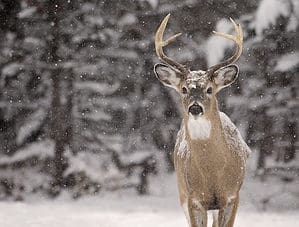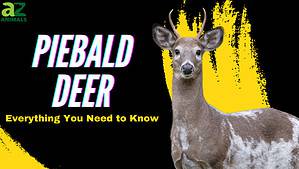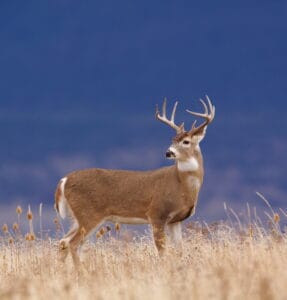Different species of deer live in many areas of the world. While they often live in the woods, they sometimes wander into urban and suburban areas in search of backyard treats. If you see a deer, it may just mean that you live in an area where deer also live. However, some people believe there is a spiritual meaning to spotting one of these graceful animals, or that it symbolizes something special in your life.
Many of the spiritual meanings that people ascribe to seeing a deer have roots in indigenous cultures. While we have often learned about these cultures in history class, we should remember that indigenous people still exist. The goal of any mention of indigenous symbolism, beliefs, and practices is to educate people on information learned strictly from indigenous sources.
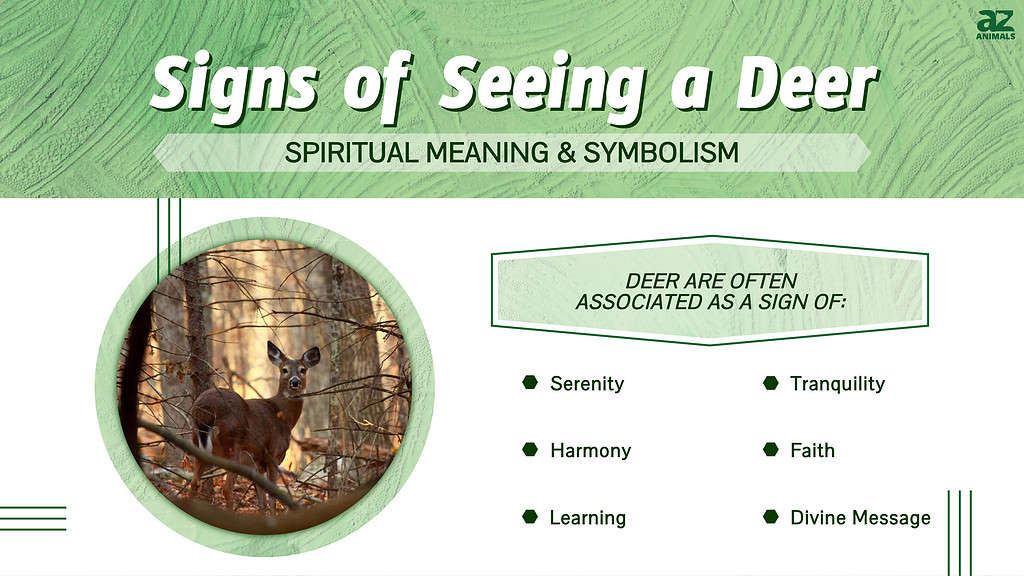
Meanings of Seeing a Deer in Different Religions and Cultures
1. Deer Meaning in Buddhism
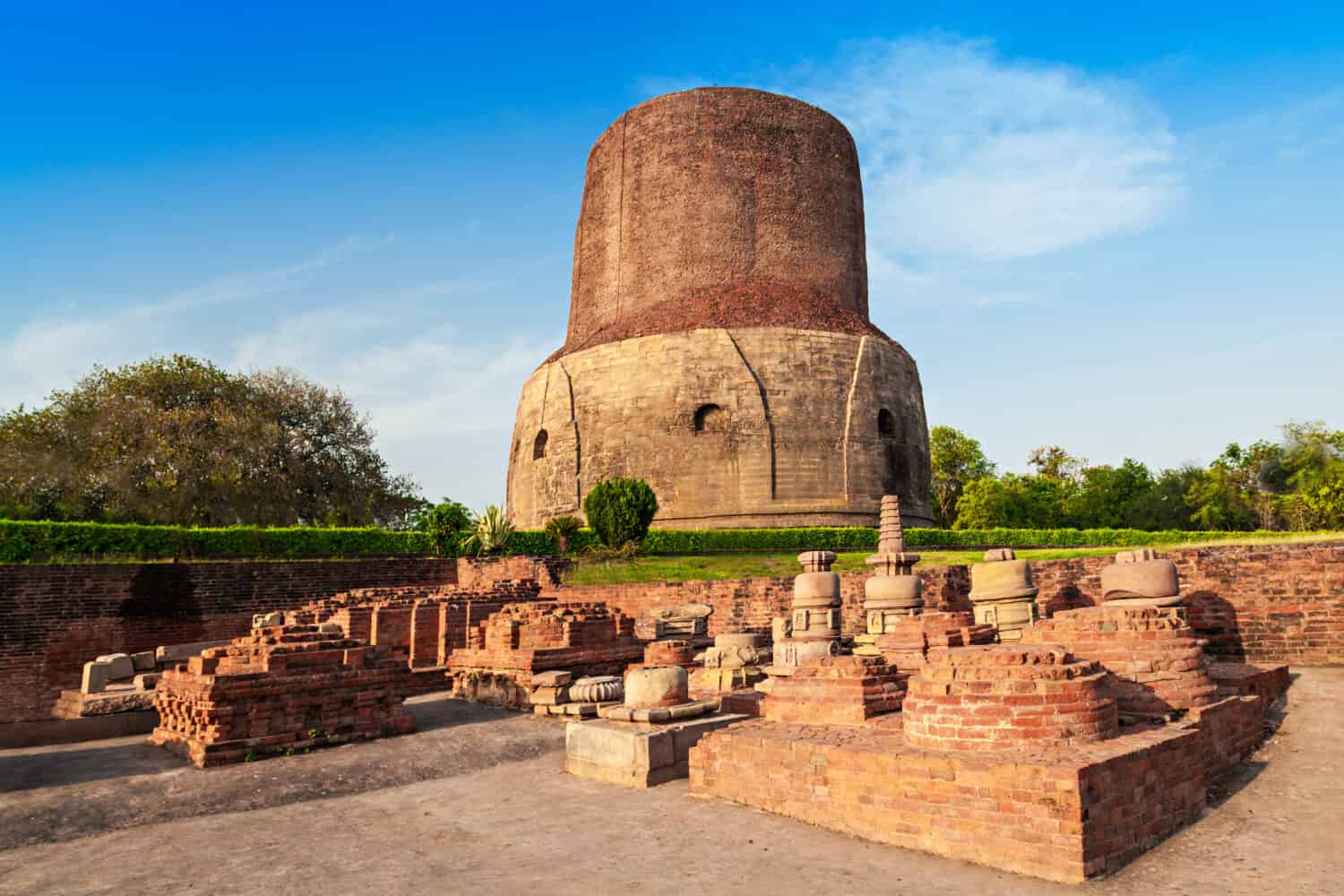
Dhamek Stupa in India, also called Deer Park, is the place where Buddha first shared his teachings.
©saiko3p/Shutterstock.com
In Buddhism, deer have a very important meaning. They are a symbol of all the Buddha’s most important teachings, and they also symbolize those who receive those lessons. This is because the Buddha first taught in a place called Dhamek Stupa, in Sarnath, Uttar Pradesh, India. It is often referred to as Deer Park in English. A king created the deer sanctuary-park after he was moved by an ancient legend about a deer who sacrificed its life for a king. So, deer were a very important presence at the start of Buddhist teachings.
There are also other important Buddhist tales that come from Sarnath. One of these stories explains why Buddhists are often vegetarian. The king would hunt deer from two herds in his deer sanctuary. Among the herds, the deer arranged for a lottery so only one would go forward to be slaughtered, rather than allowing a vigorous hunt, which would injure and potentially kill many deer. Once, a pregnant fawn got chosen in the lottery. Another deer volunteered to take her place. The king was moved by this gesture and announced he would never eat deer again. The deer replied that they would not like that if it caused the king to hunt other species more frequently. So, the king decided to stop eating animals.
For a Buddhist, seeing a deer may signify serenity, tranquility, or harmony. It can also be a reminder of the Buddha’s teachings, especially the powerful lesson that Buddhists should not take the life of any person or animal.
2. Deer Meaning in Christianity
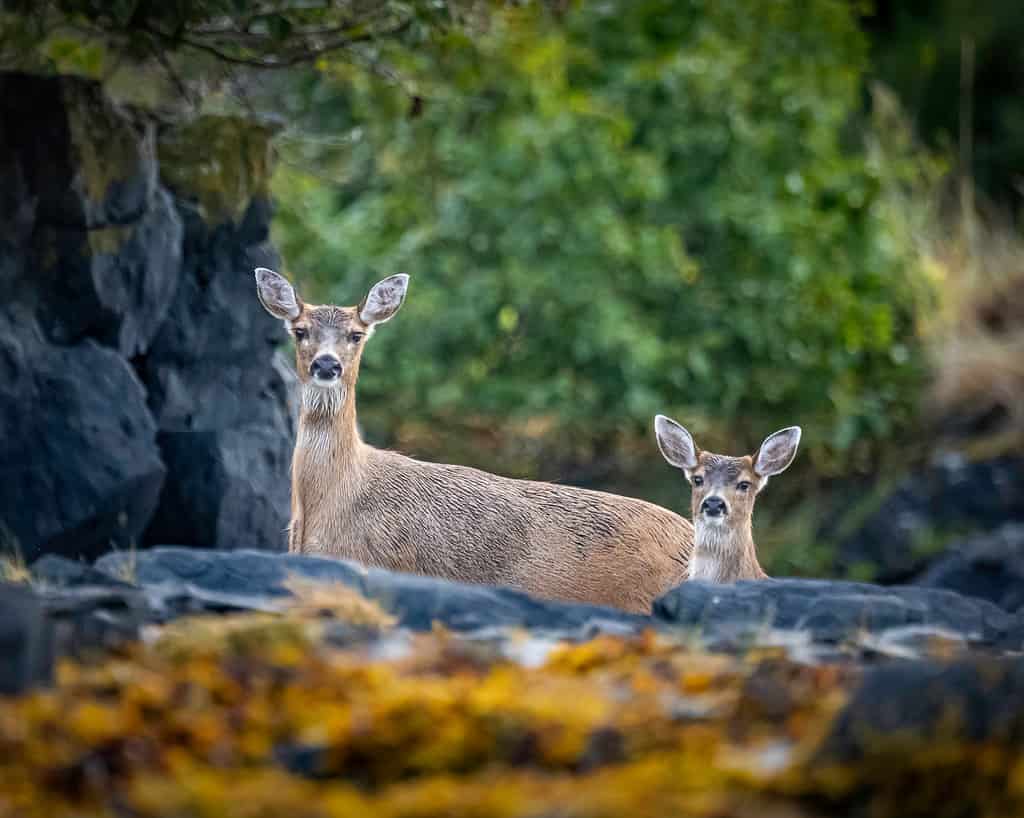
Seeing a deer may have a spiritual meaning for Christians.
©Laura Hedien/Shutterstock.com
There are several mentions of deer in both the Old Testament and the New Testament. In Psalms 42:1, David wrote: “As a deer longs for flowing streams, so my soul longs for you, O God.” In this verse, the deer represents a Christian’s essential need for a connection with God. It is like a deer’s need to find fresh, flowing water to drink. Seeing a deer could remind a Christian of that essential fulfilling desire.
In Christianity, a deer can also represent being sure of oneself. There are a few mentions in the Old Testament of God giving people feet “like deer.” This is a metaphor for strength and sure-footedness; a deer can walk up treacherous rocks and be sure of its position.
3. Deer Meaning in Judaism
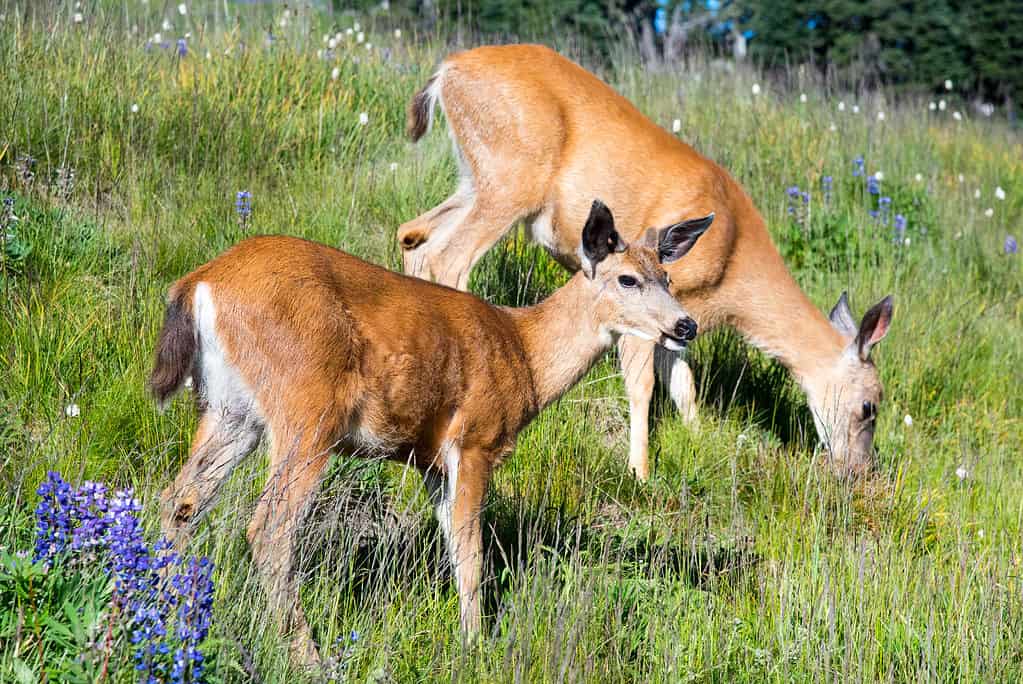
Deer are one of 10 animals with hoofs that Jewish people who keep kosher can eat.
©SteelPhotography/Shutterstock.com
The Hebrew word for deer, Tzvi, was used in the Torah to refer to the Holy Land in Judaism. Deer are also one of 10 hoofed animals that are kosher for Jewish people to eat.
There is a powerful quote from the book of Jewish ethics, the Pirkei Avot, that relates to deer. Each lesson is from an ancient sage in Judaism. The sage Yehuda ben Tema says: “Be bold as a leopard, light as an eagle, swift as a deer, and strong as a lion to do the will of your Father in heaven.” Meaning, you must take on all the best qualities of these animals to effectively live your life in an ethical and religious manner, according to Judaism.
Many words in Hebrew also have a deeper meaning. The word for deer, Tzvi, is also an abbreviation for the phrase Tzadik B’Emunoso Yichyeh, when written with Hebrew letters. This phrase means “the righteous lives by his faith.” So, for Jews, seeing a deer may be a reminder to have faith.
4. Cherokee Meaning
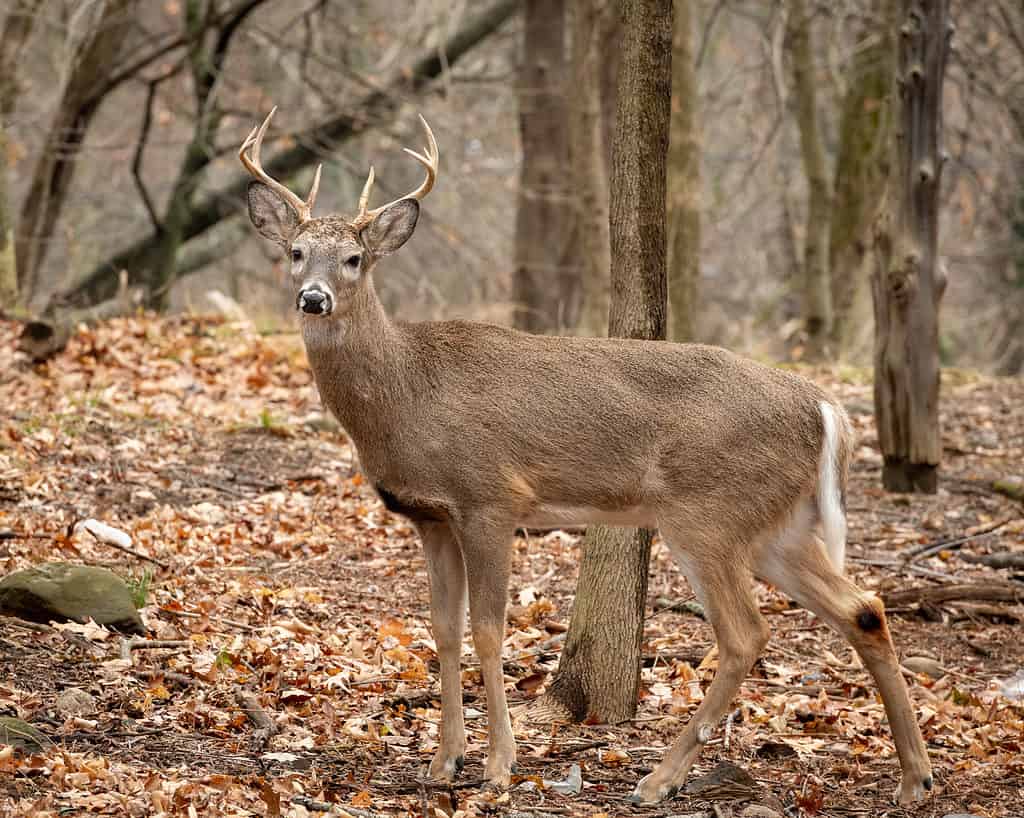
Deer are very important to the Cherokee people.
©Herbie Pabst/Shutterstock.com
The deer, particularly the white-tailed deer, is an important animal for the Cherokee people. The Cherokee have seven clans, one of which is The Deer Clan. People in this clan were responsible for tracking and hunting deer, in addition to keeping the medicine of the deer.
Deer are important both logistically and spiritually to the Cherokees. They are an important source of food, clothing, and tools.
Spiritually, deer are an explanation for chronic pain in Cherokee culture. The legend says that the spirit Little Deer was the guardian of all deer. When Cherokee hunted deer, they would pray with gratitude and reverence to Little Deer and only hunt what was needed. If a Cherokee person killed a deer unnecessarily or without praying to Little Deer, that person would be given rheumatism as a punishment, so they couldn’t hunt anymore.
A deer is sometimes seen as a messenger in Cherokee culture. It can also be a reminder of living in harmony with the environment and only taking as much as is needed from nature.
The white-tailed deer is so important to Cherokee culture that in 2014, the N.C. Wildlife Resources Commission and the Cherokee Fisheries and Wildlife Management Program started moving 25-50 white-tailed deer per year to the Eastern Band of Cherokee Indians Reservation in North Carolina after deer populations had declined.
5. Navajo Meaning
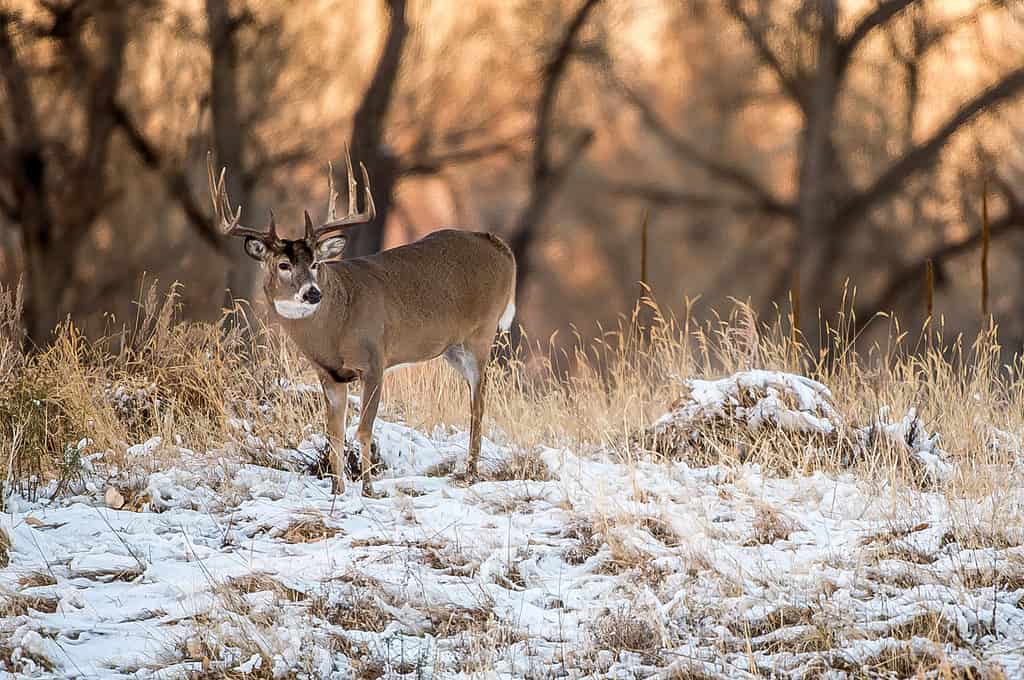
Navajo see deer as a sacred animal.
©iStock.com/Matt Dirksen
Deer are also very important and sacred to the Navajo. According to their legends, the first people were partly formed from deer hide. Traditionally, Navajo people pray or perform rituals before hunting, butchering, and eating deer, which have special significance.
6. Lakota Meaning
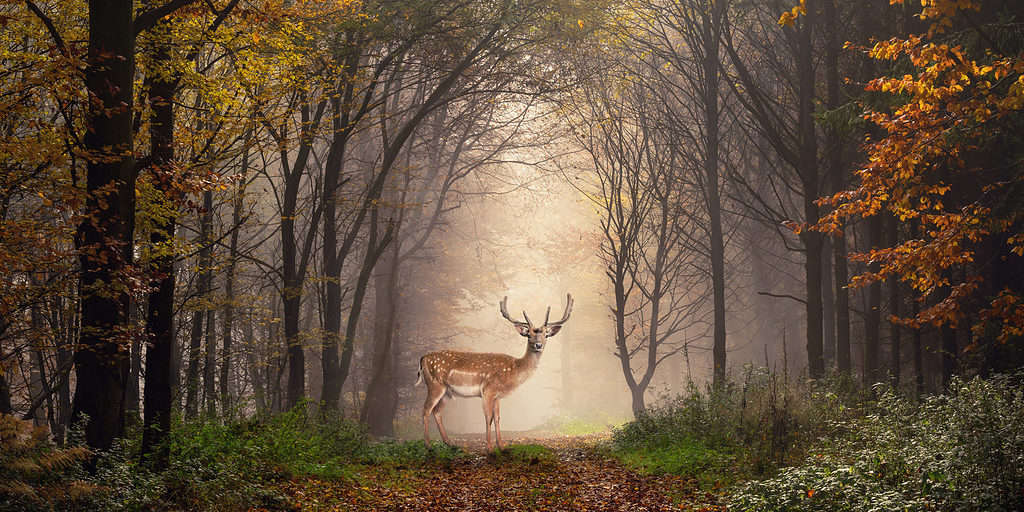
The Lakota people believe a deer could lead a man astray.
©Smileus/Shutterstock.com
The Lakota people also hold deer in high spiritual regard. They believe that deer have the power to both help and hinder people. According to their legends, a deer could appear to a man who was hunting or performing a task as a beautiful woman who would try to lead him astray before returning to its original deer form. If the man got angry and killed the deer, he was seen as weak by other members of his tribe. If he was strong and walked away, he was respected as someone who is self-possessed and powerful.
Seeing a deer could be seen as a temptation, or as a reminder to stick to your values, even when it is hard.
7. Huichol Meaning
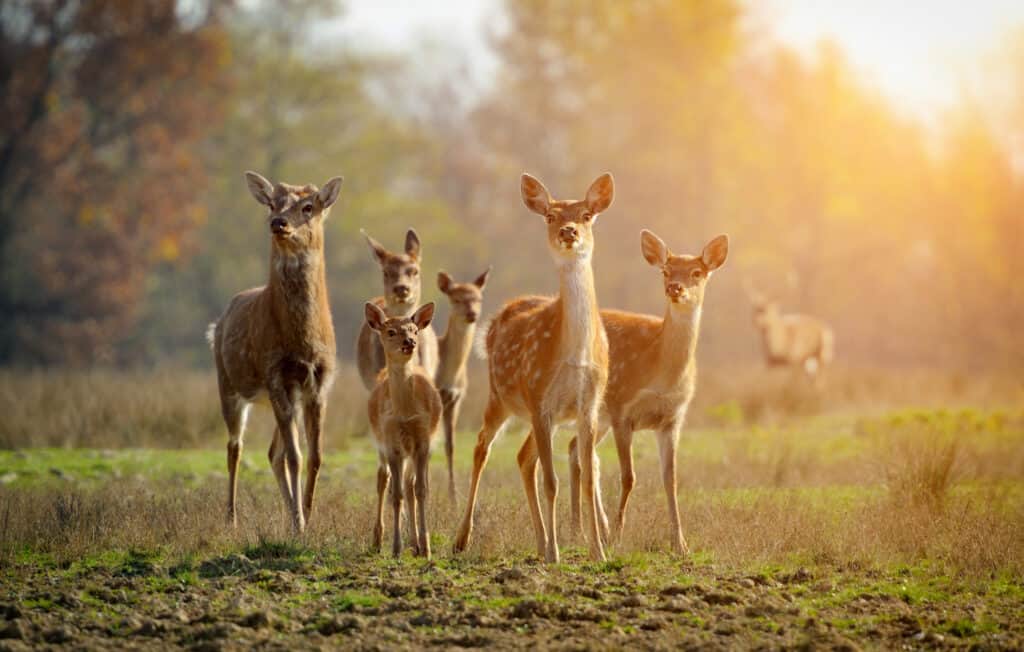
The Huichol believe the deer is spiritual because it was the first to learn the lessons of Grandfather Fire.
©Volodymyr Burdiak/Shutterstock.com
The Huichol are an indigenous tribe in what is now Mexico. Deer are very important to them. They are one of three guiding spirits, along with peyote and corn. The deer is both a guardian spirit and a guide. Huichol people use the deer spirit to help navigate the spiritual plane. According to Huichol legend, the deer was the first to learn from the original shaman.
Huichol people believe that deer willingly give their lives as long as those who hunt them do so in the proper sacred and appreciative manner. After hunting a deer, the ritual to properly thank the deer and spirits lasts for a few days.
8. Hindu Meaning
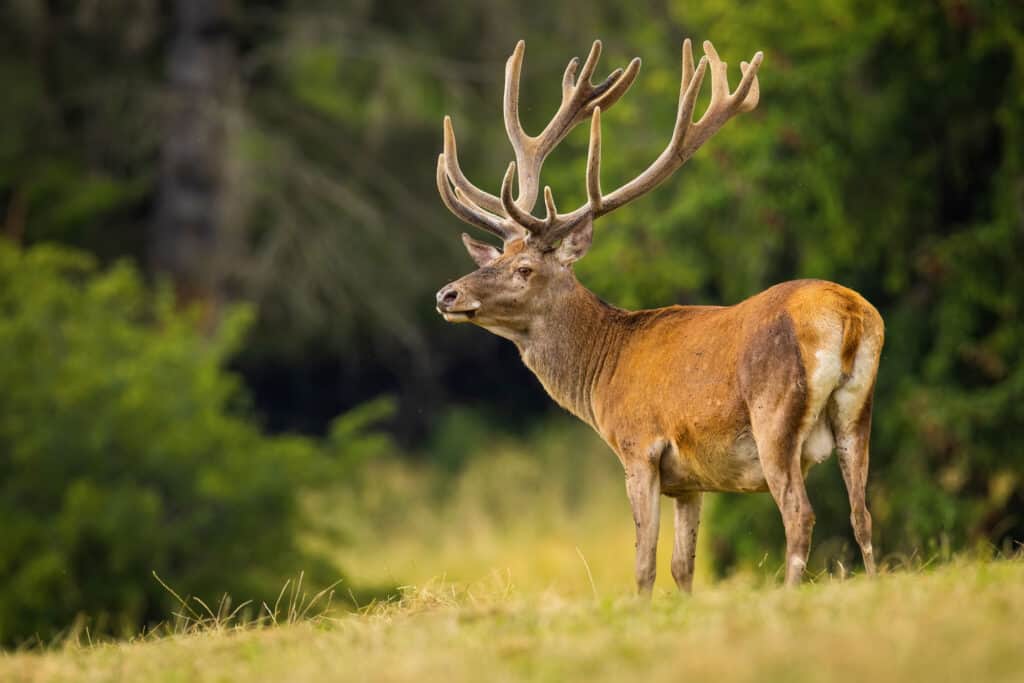
The Hindu goddess Saraswati can take the form of a red deer.
©iStock.com/JMrocek
In Hinduism, Lord Siva is often depicted holding a deer in one hand. This deer represents the way that the mind can jump from one thought to another. The four legs represent the four Vedas in Hinduism. When Siva is shown holding the deer, it shows that he is the Lord of the Vedas and that he has calmed the mind.
The goddess of learning, Saraswati, can take the form of a red deer, according to Hinduism. So, some people use a deerskin rug or mat to sit on while learning.
Seeing a deer for a Hindu person can be a reminder of the Vedas, or a sign that there will be some learning or education in their future.
9. Shinto Meaning
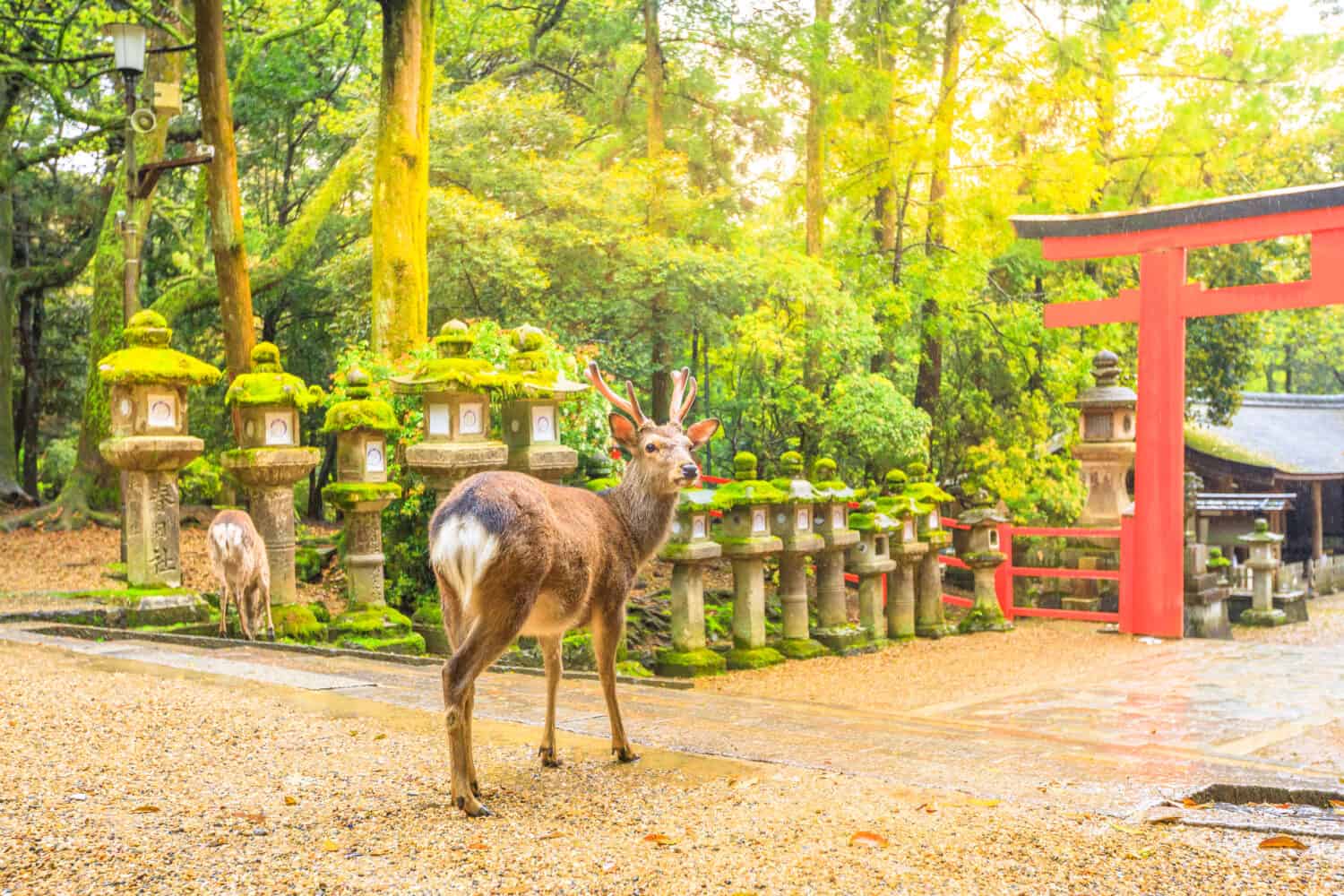
Deer are an important symbol in Shintoism.
©Benny Marty/Shutterstock.com
In the Shinto religion, deer are messengers of the gods. They can bring messages from gods to people, and vice versa. Seeing a deer may be a sign of a divine message for someone who practices Shintoism.
Other Meanings of Seeing a Deer
10. Deer Dream Meaning
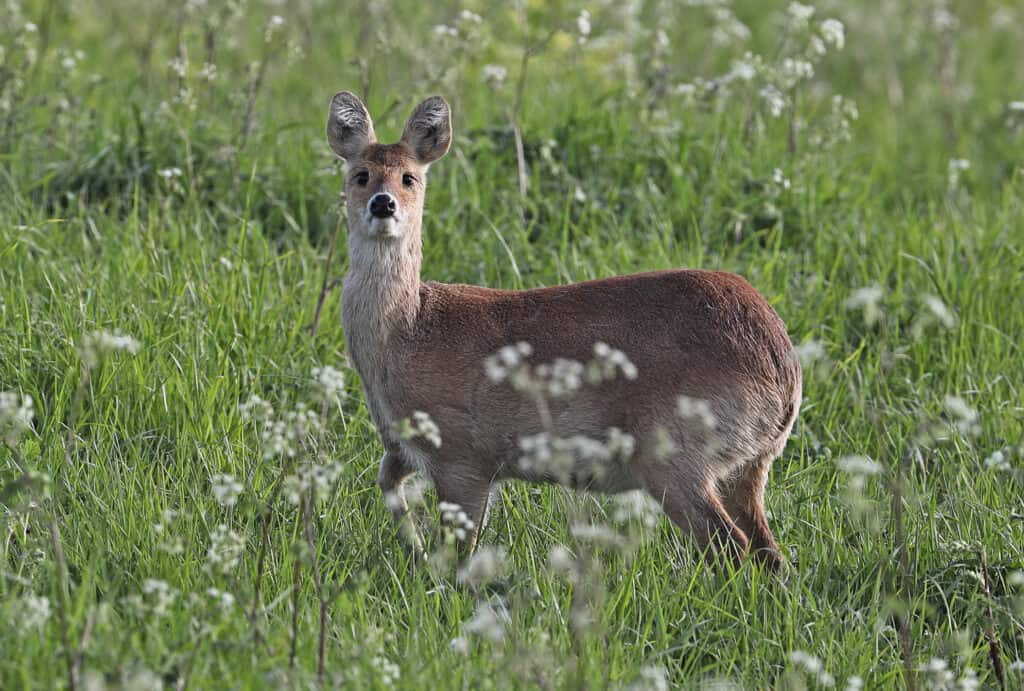
Seeing a deer in your dreams can have many meanings.
©iStock.com/Neil Bowman
The meaning of a deer in your dream depends on how many deer you saw and what was happening in your dream. Here are some common deer dream interpretations.
- Stay Vigilant: Deer are very aware of their surroundings. Dreaming about a deer could mean that you have been feeling vigilant or vulnerable in your waking life. It could be worth analyzing if there is anything making you feel on edge.
- Feeling Soft: Deer sometimes represent a softer, more emotional side of nature and life. Have you been feeling emotional or vulnerable? Or perhaps craving more vulnerability? What happened in your dream can give you some insight.
- Baby Deer: Dreaming of a baby deer symbolizes innocence and your inner child.
- Stag (Male Deer): Dreaming of a stag represents strength and self-confidence. Seeing two stags fighting could represent an inner struggle that you need to take a position on.
- Hunting a Deer: This type of dream could have many meanings. Do you feel like someone is breathing down your neck? Are you pursuing something with great interest, perhaps too much? Have you been craving a greater connection with nature and the natural order of things?
11. Deer Sighting Meaning
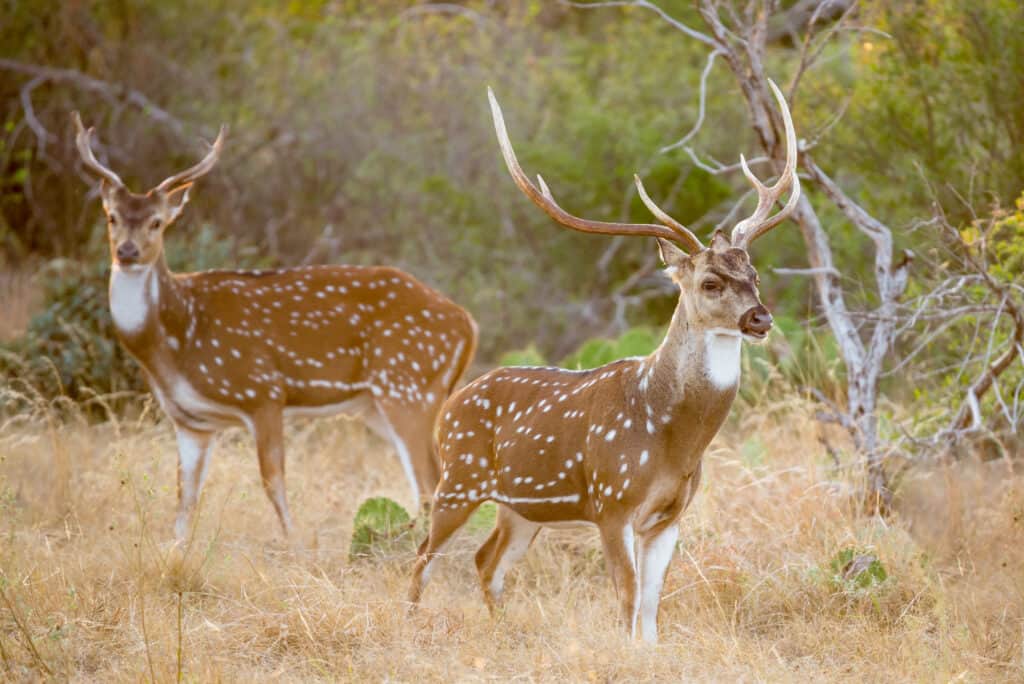
Seeing a deer in the wild can have a spiritual meaning to some people.
©GizmoPhoto/Shutterstock.com
Seeing a deer can have significance according to almost any specific religion or spiritual tradition. However, it can be a meaningful experience no matter your belief system. Seeing deer multiple times in a short period of time can be a stronger message than just seeing one. Seeing them in unexpected places can also be a sign that there is a message behind the deer sighting.
Follow Your Intuition
Deer are always very vigilant. They live and die by their intuition. Humans have a tendency to doubt our hunches and gut feelings. Seeing a deer can be a strong sign to listen to your gut. Your intuition is often right, as long as it is fueled by truthful ideas.
Speed and Agility
Deer are very agile and are fast runners. Have you been feeling stuck or energetically clumsy? Perhaps you’ve been navigating a tricky situation and you need a reminder of the deer’s nimble way of moving through the landscape. Seeing a deer can remind you to tread lightly and move quickly in order to have the best outcome. Sometimes the best solution to a problem is actually quite simple, but humans tend to make things complicated.
Be Gentle Yet Strong
Deer are masters of gentleness, yet are strong and fierce when necessary. Seeing a deer can be a reminder that holding boundaries can be done kindly and with grace. Humans have a tendency to hesitate when setting a boundary because some have been taught it might be mean or even rude. However, taking a cue from the deer’s gentle strength can help us figure out how to navigate these tricky situations with kindness.
12. White Deer Meaning
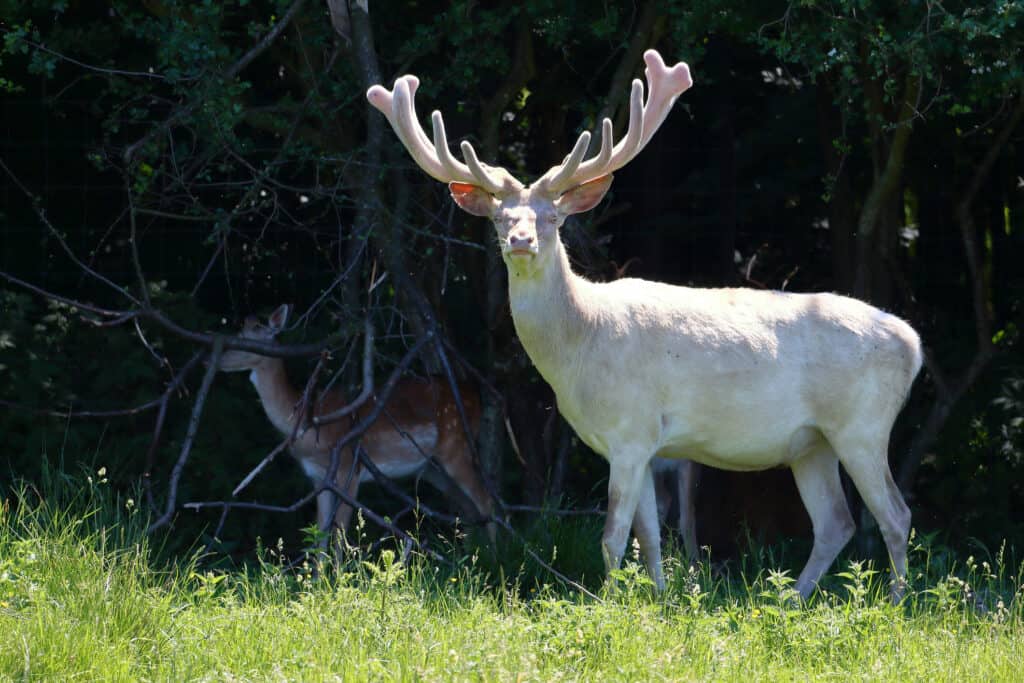
It is rare for albino white deer to live to adulthood, like this one.
©iStock.com/giannimarchetti
White deer are extremely rare. Their white color is usually caused by albinism or leucism, two different recessive genetic traits that cause them to be all white. Albino deer have pink eyes and noses. Most white deer spotted in the wild have leucism because albino animals do not usually live for very long, mainly due to poor eyesight and lack of camouflage. Deers with leucism are either all white or half white and half brown. They have black noses. They also don’t live as long as normal deer, because they are less well-camouflaged. However, they usually have normal eyesight, so they have a chance of a longer life than albino deer.
Because of their rarity, seeing a white deer has a significant meaning. In many cultures that have a history of hunting, if you kill a white deer, you will have bad luck for the rest of your life and may never hunt another deer successfully again. Many Native American and First Nation tribes believe seeing a white deer can bring good fortune. They can also represent purity and sacredness.
In our modern society, some hunters believe that a white deer makes for a unique trophy. However, the majority of people seem to think that these animals should be left alone because they are so rare.
The photo featured at the top of this post is © WildMedia/Shutterstock.com
Thank you for reading! Have some feedback for us? Contact the AZ Animals editorial team.



